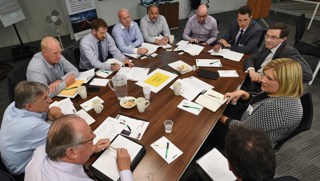Fleet decision-makers must undertake detailed planning and have a clear vision of what they want to achieve in an ever-changing environment, but there is no magic management formula that fits every organisation.
That is the view of Geoffrey Bray, a fleet industry veteran of 50 years and chairman of the newly-launched Fleet Industry Advisory Group (FIAG), which is dedicated to developing and sharing best practice among fleet decision-makers while simultaneously raising money for the national Hope for Tomorrow charity.
He told more than 50 delegates at FIAG’s launch workshop - Experience - Driving Change - held at the Arnold Clark Group’s GTG Training Academy, Bearing Drive, Wolverhampton: “Fleet managers should challenge the status quo and look at how vehicles are currently being managed and perhaps do it somewhat differently.
“Everyone should have a quest when they are managing cars, vans, trucks and plant and search for the Holy Grail.”
Billing FIAG as a family of fleet professionals with a wealth of fleet experience and unbiased advice available, Bray said: “There is no one size fits all approach to fleet management policy. There is no right or wrong way.
“A policy is right if it satisfies the operational objectives delivering a cost efficient fleet operation.
“The demands on all fleet decision-makers have changed and continue to change over the 50 years that I have been involved in the fleet industry. Fleet managers must continue to become smarter and better at what they do. For the beginner managing a fleet looks extremely complicated.
“But once those newcomers have defined what their objective is they can instigate a plan.”
Explaining that he wanted FIAG to become the “go to” organisation for fleet decision-makers in terms of policy advice and information, Bray said: “If you want to stand out as a fleet manager you have to be bold and stick to your beliefs and principles.
“Too often I have seen cop-out management and have seen a fleet policy compiled as a result of consensus management. That results in a fleet policy in which no-one really believes, but to which no-one objects. A consensus fleet policy exists in many organisations - it is the easy option.”
He concluded: “Everything in fleet continues to change and fleets and fleet managers must change accordingly and face the consequences.
"The status quo must be loosened; possible solutions explored; new initiatives implemented and decisions justified.”

















Login to comment
Comments
No comments have been made yet.